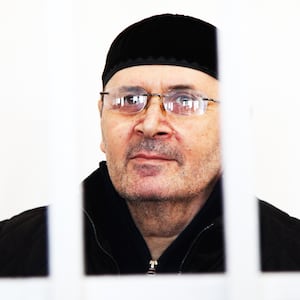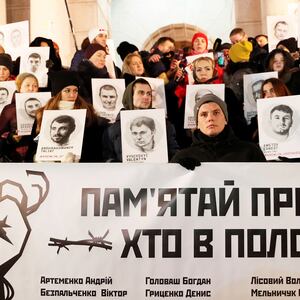MOSCOW—The day the Interior Ministry decided to close the criminal investigation against journalist Ivan Golunov of the independent Meduza news organization will be remembered as a moment of freedom for every Russian.
Police had detained Golunov on drug charges last week and he was facing more than 10 years in prison, but thanks to unprecedented journalistic solidarity, the authorities had to step back and admit that the reporter was framed.
On the day policemen were dragging a terrified Golunov around Moscow, Russian President Vladimir Putin was meeting with Chinese leader Xi Jinping at the St. Petersburg Economic Forum. Golunov’s investigators apparently had no idea that their criminal actions were spoiling both Russia’s and Putin’s reputation.
Last Thursday, the police planted bags of drugs in Golunov’s backpack and in his house; they even claimed that there was a “drug laboratory” in his one-room flat.
Clearly, whoever ordered the arrest of the well-known investigative reporter, who had been looking into police corruption, could not imagine the level of public fury that would follow.
Journalists protested against the repressive police system day and night; we all realized it was our freedom, our voices, that the police wanted to silence.
Victory came on Tuesday afternoon when Ivan, with his pet dog in his hands, walked free from his house arrest to meet the crowd of happy supporters, his friends and colleagues.
Russian police often frame Putin’s critics using the strict drug law, Article #228 of the criminal code, and another harsh article, #282, against “actions aimed at the incitement of hatred or enmity.”
The protests in favor of Golunov were also directed at the arbitrary use of those laws, and on the same day the Moscow police dropped their investigation of Golunov, a Chechen court freed Oyub Titiyev, the head of the Memorial human rights center in the city of Grozny. He too was arrested after police “found” drugs in his vehicle last January. From the day of his arrest, the entire international human rights community had been supporting Titiyev, insisting that the Chechen police had planted drugs in order to close down Memorial’s center in Grozny.
Many in the Russian journalistic community believed that they should continue the struggle for changes in the corrupt police system, where officers often violate their authority. “We have to deprive Russian law enforcement agencies of their repressive tools, to demand punishment for those who arrested Golunov and fabricated his case,” Irina Gordiyenko, a journalist at Novaya Gazeta, told The Daily Beast shortly after Interior Minister Vladimir Kolokoltsev shut down the criminal case against Golunov. The official admitted in his statement that there was no evidence whatsoever proving the journalist’s guilt.
To celebrate the victory, many friends raised their glasses on Tuesday night, toasted to change, to media freedom, and justice in Russia, where independent human rights defenders have reported on hundreds of fabricated criminal cases. But what felt like a fresh wind of positive reform disappeared on Wednesday, which was Russia Day, a national holiday.
Moscow police detained more than 400 peaceful demonstrators who joined the non-sanctioned march on Wednesday calling for punishment for Golunov’s investigators. People of all ages peacefully walked down Moscow’s central streets with “We Are Golunov” signs in their hands. It was a new fashionable symbol.
Leading publications, including the newspapers Kommersant, Vedomosti, and RBK, came out with “We Are Golunov” on their front pages. People printed the slogan on their T-shirts. A young woman showed up at a Kremlin rally dedicated to Russia Day wearing a “We Are Golunov” T-Shirt.
Golunov’s illegal detention inspired hundreds of Muscovites to join the non-sanctioned protest on Russia Day, in spite of the risk of detention.
Even the daughter of Kremlin spokesman Dmitry Peskov, Yelizaveta, joined the anti-government protest. Some participants noticed her, when she was shooting a video of the march with her cellphone.
One of the organizers of the march, journalist Yevgeny Berg, managed to call Alexander Gorbenko, a deputy Moscow mayor, a few seconds before police grabbed him.
“Yesterday you said that everything was going to be OK, what went wrong?” Berg demanded. “Police are detaining people right now in front of my eyes. Ordinary people without any banners, why?” Police detained Berg in the middle of the conversation. “They’ve just detained me, would you like to speak with the policemen, Alexander Nikolayevich?”
The Echo of Moscow radio station published a transcript of the conversation.
The illegal police actions became obvious to the entire country: For three days the clumsy, unprofessional police system aimed to break Golunov’s spirit. The reporter was in tears during his Friday court hearing. “I could never imagine I’d see my own funeral,” he said as he looked out from the courtroom cage at this friends and colleagues.
Instead of embracing the public demand for change, for reforms, Russia’s repressive machine acted in the only way it knows, detaining the protesters, including more than a dozen of the best Russian journalists.
“Some militia in black uniforms act like Nazis, grab, dragged people away from the Hermitage Garden in Moscow,” Zoya Svetova, a human rights defender, told The Daily Beast on Wednesday afternoon. “Nothing is going to change in Russia for as long as we have this authoritarian system of management; the authorities do not realize that this is a short-sighted method of choking the discontent.”








